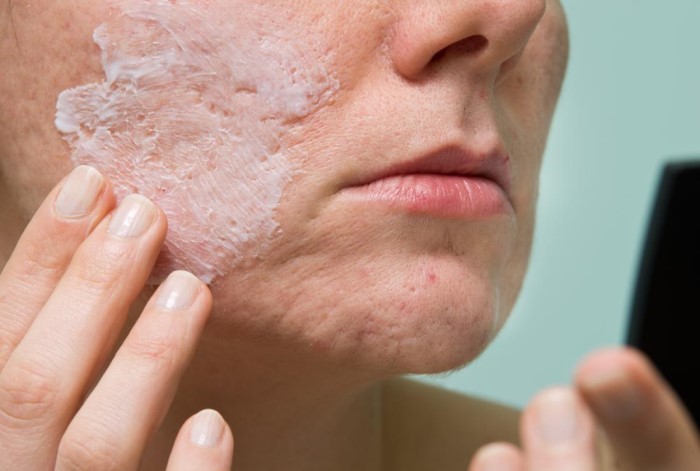
Aspirin for Acne
Aspirin for Acne
Acne is a common skin condition that affects people of all ages. It can be frustrating and have a negative impact on one’s self-esteem. While there are numerous over-the-counter and prescription treatments available, some people turn to alternative remedies like aspirin to help alleviate their acne symptoms. In this article, we will explore whether aspirin can effectively treat acne and provide insights on how to use it.
Acne is a skin condition characterized by the presence of pimples, blackheads, whiteheads, and sometimes cysts or nodules. It occurs when hair follicles become clogged with oil, dead skin cells, and bacteria. Acne can be influenced by various factors, including hormonal changes, genetics, and lifestyle.
What is Aspirin?
Aspirin, also known as acetylsalicylic acid, is a common medication widely used to relieve pain, reduce inflammation, and lower fever. It belongs to a class of drugs called nonsteroidal anti-inflammatory drugs (NSAIDs). Aspirin is readily available over the counter and has been a staple in medicine cabinets for decades.
Aspirin’s Potential Benefits for Acne
While aspirin is primarily used to treat pain and inflammation, some people believe it can also help with acne. Advocates of using aspirin for acne claim that its anti-inflammatory properties can reduce redness and swelling associated with pimples. Additionally, aspirin is said to exfoliate the skin gently, unclog pores, and promote a clearer complexion.
How Does Aspirin Work for Acne?
Aspirin contains salicylic acid, a beta-hydroxy acid (BHA) commonly found in many skincare products targeted towards acne-prone skin. Salicylic acid has exfoliating properties, meaning it helps remove dead skin cells and unclog pores. When applied topically or used in face masks, aspirin can provide similar benefits by gently exfoliating the skin and promoting a smoother appearance.
How to Use Aspirin for Acne
To use aspirin for acne, follow these steps:
- Start with a few uncoated aspirin tablets.
- Crush the tablets into a fine powder using a mortar and pestle or by placing them in a plastic bag and crushing them with a spoon.
- Add a small amount of water or a gentle toner to the crushed aspirin powder to form a paste.
- Apply the paste directly to the affected areas or use it as a face mask, leaving it on for 10-15 minutes.
- Gently rinse off the aspirin paste with lukewarm water.
- Moisturize your skin afterward to prevent dryness.
Remember, everyone’s skin is unique, and what works for one person may not work for another. It’s essential to perform a patch test before applying aspirin topically to ensure you don’t have any adverse reactions.
Precautions and Side Effects
While aspirin is generally safe when used as directed, it’s crucial to consider the following precautionsand potential side effects:
- Allergy: Some individuals may be allergic to aspirin or other NSAIDs. If you experience symptoms like hives, difficulty breathing, or swelling after using aspirin, discontinue use immediately and seek medical attention.
- Skin Sensitivity: Aspirin can cause skin irritation and dryness in some people, especially those with sensitive skin. If you notice excessive redness, burning, or itching, discontinue use and consult a dermatologist.
- Salicylate Sensitivity: Individuals who are sensitive to salicylates should avoid using aspirin topically. Salicylate sensitivity can manifest as a rash, swelling, or respiratory symptoms. If you suspect you have a salicylate sensitivity, consult a healthcare professional before using aspirin for acne.
- Interaction with Medications: Aspirin can interact with certain medications, such as blood thinners or other NSAIDs. If you’re taking any medications, it’s essential to consult your healthcare provider before using aspirin for acne to prevent any potential interactions or adverse effects.
Other Home Remedies for Acne
While aspirin may offer potential benefits for acne, it’s worth noting that there are several other home remedies that you can try alongside it. Some commonly recommended remedies include:
- Tea Tree Oil: Known for its antimicrobial properties, tea tree oil can help reduce acne-causing bacteria. Dilute tea tree oil with a carrier oil before applying it to the skin.
- Honey and Cinnamon Mask: A mixture of honey and cinnamon can possess antibacterial and anti-inflammatory properties. Apply the mask to the affected areas and leave it on for 10-15 minutes before rinsing off.
- Green Tea: Green tea contains antioxidants that can help reduce inflammation. You can apply cooled green tea as a toner or drink it regularly to potentially benefit your skin.
Remember, these remedies may work differently for each individual, so it’s important to find what works best for you and consult a dermatologist for personalized advice.
When to Seek Professional Help
While home remedies like aspirin can be useful for mild to moderate acne, it’s crucial to seek professional help if:
- Your acne is severe, widespread, or painful.
- Home remedies haven’t provided significant improvement after a reasonable trial period.
- You experience emotional distress or a negative impact on your self-esteem due to your acne.
- You have underlying health conditions that may contribute to or worsen your acne.
A dermatologist can assess your specific condition and recommend appropriate treatments tailored to your needs.
Aspirin: Does It Have Any Role in Dermatology?
Aspirin, a widely used over-the-counter medication, has long been known for its pain-relieving and anti-inflammatory properties. However, its applications in dermatology go beyond these traditional uses. In recent years, there has been growing interest in exploring the potential benefits of aspirin in treating various skin conditions, including acne. In this article, we will delve into the role of aspirin in dermatology and specifically its effectiveness in treating acne. We will also discuss how to use aspirin for acne and highlight possible side effects and precautions.
Aspirin for Acne: Is It Effective?
Acne, a common skin condition, can cause physical discomfort and impact self-esteem. Many individuals seek effective treatments to manage their acne symptoms. While there are numerous options available, some people turn to aspirin as a potential remedy.
Aspirin contains salicylic acid, a beta-hydroxy acid (BHA) that is widely used in skincare products for its exfoliating properties. Salicylic acid helps to unclog pores, reduce inflammation, and promote skin cell turnover. These characteristics make it a popular ingredient in acne treatments.
When used topically, aspirin is believed to offer benefits in managing acne. It can potentially reduce redness and swelling associated with pimples, exfoliate the skin, and promote a clearer complexion. However, it’s important to note that individual results may vary, and aspirin may not be effective for everyone. It is always advisable to consult a dermatologist for personalized advice.
How to Use Aspirin for Acne
Using aspirin for acne is a simple process that involves creating a paste or mask for topical application. Here’s a step-by-step guide on how to use aspirin for acne:
- Start with a few uncoated aspirin tablets. Avoid using coated or enteric-coated tablets as they may not dissolve properly.
- Crush the aspirin tablets into a fine powder. You can use a mortar and pestle or place the tablets in a plastic bag and crush them with a spoon.
- Add a few drops of water or a gentle toner to the crushed aspirin powder. Mix well to form a paste. You can also add a small amount of honey or aloe vera gel for additional soothing properties.
- Apply the aspirin paste directly to the affected areas or use it as a face mask, ensuring to cover the acne-prone regions.
- Leave the paste on for about 10-15 minutes to allow the aspirin’s properties to work on the skin.
- Gently rinse off the paste with lukewarm water, making sure to remove all traces of the aspirin.
- Pat your skin dry and follow up with a moisturizer suitable for acne-prone skin to prevent dryness.
It’s important to note that using aspirin for acne should be done in moderation. Start with a small area to perform a patch test and observe how your skin reacts before applying it to larger areas. If you experience any adverse reactions or increased skin irritation, discontinue use and consult a dermatologist.
Possible Side Effects of Topical Aspirin and Precautions
While aspirin is generally considered safe when used topically, some individuals may experience side effects or have specific precautions to consider. Here are some important points to keep in mind:
- Allergic Reactions: Some individuals may be allergic to aspirin or salicylic acid. If you develop symptoms like rash, itching, swelling, ordifficulty breathing after using aspirin topically, discontinue use immediately and seek medical attention.
- Skin Sensitivity: Aspirin can cause skin irritation, especially in individuals with sensitive skin. If you notice excessive redness, burning, or stinging sensations, stop using aspirin and consult a dermatologist.
- Dryness and Peeling: Aspirin’s exfoliating properties may lead to dryness and peeling of the skin. It’s important to moisturize your skin adequately and avoid using aspirin too frequently to prevent excessive dryness.
- Salicylate Sensitivity: Some individuals may be sensitive to salicylates, which are present in aspirin. If you have known sensitivity to salicylates or aspirin, it’s best to avoid using aspirin topically or consult a healthcare professional before doing so.
- Interaction with Other Medications: Aspirin, even when used topically, may interact with certain medications. If you’re taking any oral medications, especially blood thinners or other NSAIDs, it’s crucial to consult your healthcare provider before using aspirin for acne.
- Sun Sensitivity: Aspirin may increase your skin’s sensitivity to the sun. It’s important to wear sunscreen and protect your skin from excessive sun exposure while using aspirin for acne.
As with any skincare product or treatment, it’s advisable to consult a dermatologist before incorporating aspirin into your skincare routine. They can assess your skin condition, recommend appropriate treatments, and provide personalized guidance based on your specific needs and medical history.
In conclusion, while aspirin may have a potential role in dermatology, particularly in the treatment of acne, its effectiveness can vary from person to person. When used topically, aspirin’s salicylic acid content can help exfoliate the skin, reduce inflammation, and unclog pores. However, it’s important to use aspirin in moderation, perform patch tests, and discontinue use if any adverse reactions occur. Consulting a dermatologist is always recommended for personalized advice and to explore the most suitable treatment options for acne and other skin concerns.
The Science Behind How Aspirin May Work for Acne
Aspirin, commonly known for its pain-relieving properties, has gained attention in the field of dermatology for its potential benefits in treating acne. While the exact mechanisms of how aspirin works on acne are not fully understood, several scientific theories shed light on its potential efficacy. In this article, we will explore the science behind how aspirin may work for acne, the types of acne it might treat, and its safety considerations.
Anti-Inflammatory Effects
One of the key factors contributing to the development of acne is inflammation. Aspirin contains salicylic acid, which has anti-inflammatory properties. When applied topically, salicylic acid can help reduce inflammation in the skin, leading to a decrease in the redness and swelling associated with acne lesions. By targeting the inflammatory response, aspirin may help alleviate acne symptoms.
Exfoliation and Unclogging Pores
Another way aspirin may work for acne is through its exfoliating properties. Salicylic acid, a beta-hydroxy acid (BHA) found in aspirin, can penetrate the skin and help exfoliate the top layer of dead skin cells. By removing these dead cells, aspirin may help unclog pores and prevent the formation of comedones (blackheads and whiteheads) that contribute to acne development.
Salicylic acid also possesses keratolytic properties, meaning it can help dissolve the bonds between skin cells. This gentle exfoliation can promote smoother skin texture and potentially reduce the appearance of acne scars or hyperpigmentation.
Types of Acne It Might Treat
Aspirin, when used topically, may be beneficial for certain types of acne. It is most commonly recommended for inflammatory acne, which includes papules, pustules, and nodules. These types of acne lesions are often characterized by redness, swelling, and tenderness. Aspirin’s anti-inflammatory properties can help reduce these symptoms and promote healing.
It’s important to note that aspirin may be less effective for non-inflammatory acne, such as comedones (blackheads and whiteheads), as they are not primarily driven by inflammation. However, aspirin’s exfoliating properties may still contribute to preventing the formation of new comedones.
Safety Considerations
When used properly, aspirin is generally considered safe for topical application in treating acne. However, there are some important considerations:
- Sensitivity and Allergy: Some individuals may be sensitive or allergic to aspirin or salicylic acid. It’s essential to perform a patch test before applying aspirin to a larger area of the skin. If you experience any adverse reactions, such as redness, itching, or swelling, discontinue use and consult a dermatologist.
- Skin Irritation: Aspirin, especially in high concentrations or when used too frequently, can cause skin irritation and dryness. It’s crucial to follow the recommended guidelines and not exceed the recommended usage. If you experience excessive dryness or irritation, adjust the frequency or concentration of aspirin use.
- Interaction with Other Medications: If you’re taking any oral medications or have underlying health conditions, it’s important to consult a healthcare professional before using aspirin for acne. They can advise on potential interactions and ensure it’s safe for you to incorporate aspirin into your skincare routine.
- Sun Sensitivity: Salicylic acid, present in aspirin, can increase the skin’s sensitivity to the sun. It’s vital to use sunscreen and protect your skin from excessive sunexposure when using aspirin for acne. This can help prevent sunburn and other sun-related skin damage.
- Use in Pregnancy: Pregnant or breastfeeding individuals should consult their healthcare provider before using aspirin topically for acne. While topical use is generally considered safe, it’s important to discuss any potential risks or concerns with a healthcare professional.
It’s worth noting that aspirin is not a standalone treatment for acne, and results may vary from person to person. It’s always recommended to consult a dermatologist for a comprehensive evaluation of your acne and to discuss the most suitable treatment options based on your individual needs.
In conclusion, the science behind how aspirin may work for acne involves its anti-inflammatory effects and exfoliating properties. Aspirin’s salicylic acid content can help reduce inflammation, unclog pores, and promote smoother skin texture. It may be particularly beneficial for inflammatory acne lesions. However, it’s important to consider safety precautions, perform patch tests, and consult a healthcare professional if needed. Remember, a personalized approach to acne treatment is key, and a dermatologist can provide expert guidance based on your specific condition.
Is Aspirin Good for Acne?
Aspirin has gained popularity as a potential home remedy for acne due to its anti-inflammatory and exfoliating properties. While it may offer benefits for some individuals, whether or not aspirin is good for acne depends on various factors and individual responses. In this article, we will address common questions related to using aspirin for acne and provide insights to help you make an informed decision.
Can I Leave Aspirin on My Pimples Overnight?
Leaving aspirin on your pimples overnight is generally not recommended. Aspirin masks or pastes are typically applied for a limited period, usually 10-15 minutes, before rinsing off. Prolonged exposure to aspirin on the skin may lead to irritation, dryness, or even chemical burns, especially if you have sensitive skin. It’s best to follow the recommended usage guidelines and consult a dermatologist for personalized advice.
Is It Safe to Use Aspirin on the Face?
When used properly, aspirin can be safe for topical use on the face. However, it’s important to consider a few factors:
- Skin Sensitivity: Aspirin may cause skin irritation, especially in individuals with sensitive skin. It’s crucial to perform a patch test before applying aspirin to a larger area of the face. If you experience any adverse reactions like redness, itching, or swelling, discontinue use and consult a dermatologist.
- Concentration and Frequency: It’s advisable to use a diluted aspirin paste or mask, rather than applying undiluted aspirin directly to the skin. Additionally, using aspirin too frequently or in high concentrations may lead to skin dryness, irritation, or other unwanted effects. Follow the recommended guidelines and adjust the frequency based on your skin’s response.
- Other Ingredients: Some aspirin formulations may contain additives or coatings that can be harsh on the skin. It’s best to opt for uncoated, plain aspirin tablets for topical use to minimize the risk of irritation.
Always remember that everyone’s skin is unique, and what works for one person may not work for another. Consulting a dermatologist can provide personalized guidance based on your specific skin type and condition.
How Long Does It Take for Aspirin to Remove Pimples?
The timeline for aspirin to remove pimples can vary depending on the individual and the severity of the acne. Aspirin’s effects on acne are not instantaneous, and it may take time to see noticeable improvements. Consistency is key when using aspirin for acne. Regular and proper application over a period of weeks or months may help reduce inflammation, unclog pores, and promote clearer skin. However, if you’re not seeing satisfactory results or if your acne worsens, it’s crucial to consult a dermatologist for further evaluation and guidance.
Can Aspirin Lighten Skin or Clear Dark Spots?
Aspirin is not specifically known for its skin-lightening properties or for clearing dark spots. While the exfoliating effects of aspirin may help improve overall skin texture and promote a more even complexion, it’s not a targeted solution for lightening the skin or addressing dark spots caused by factors such as hyperpigmentation. Other skincare treatments or procedures may be more appropriate for lightening the skin or addressing specific types of dark spots, and it’s advisable to consult a dermatologist for personalized recommendations.
In summary, aspirin may offer potential benefits for some individuals in managing acne. However, its efficacy and safety depend on various factors, including skin sensitivity and individual response. It’s important to follow the recommended guidelines, perform patch tests, and consult a dermatologist for personalized advice. Remember that aspirin is not a miracle cure for acne, and a comprehensive approach to skincare, including proper cleansing, moisturizing, and professional guidance, is essential for managing acne effectively.
Conclusion
Using aspirin for acne is a popular home remedy that may offer some benefits due to its anti-inflammatory and exfoliating properties. However, it’s important to remember that individual results may vary, and it’s always best to consult a dermatologist for personalized advice. Additionally, consider trying other home remedies and maintaining a consistent skincare routine to support overall skin health.
FAQs
1. Can aspirin completely cure acne?
Aspirin cannot completely cure acne on its own. It can help reduce inflammation and unclog pores, but a comprehensive approach involving proper skincare, lifestyle changes, and professional guidance may be necessary for more significant and long-lasting results.
2. How often should I use aspirin for acne?
It is recommended to use aspirin for acne as a spot treatment or face mask once or twice a week. Overuse may lead to skin dryness and irritation, so it’s important to listen to your skin and adjust usage accordingly.
3. Can I use aspirin if I have sensitive skin?
Individuals with sensitive skin should be cautious when using aspirin topically. It’s advisable to perform a patch test before applying it to the entire face and discontinue use if any adversereactions occur. Consulting a dermatologist is recommended for personalized advice.
4. Are there any alternative treatments for acne?
Yes, there are various alternative treatments for acne. Some options include topical creams or gels containing ingredients like benzoyl peroxide or retinoids, oral medications prescribed by a dermatologist, chemical peels, and laser therapy. It’s best to consult a dermatologist to determine the most suitable treatment for your specific acne condition.
5. Can I take aspirin orally to treat acne?
Oral aspirin is not typically recommended for treating acne. Its anti-inflammatory properties may provide some benefits, but it’s important to consult a healthcare professional before using aspirin orally for acne to assess potential risks, and interactions with other medications, and determine the appropriate dosage.
In conclusion, while aspirin may offer some benefits for acne due to its anti-inflammatory and exfoliating properties, it’s essential to consider individual skin sensitivities, perform patch tests, and consult a dermatologist for personalized advice. Incorporating a holistic skincare routine and seeking professional help when necessary can greatly contribute to managing and improving acne.








